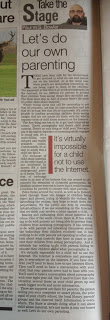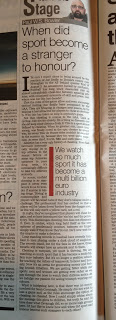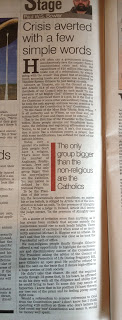My column in The Kerryman. 28 August, 2013
One thing we can say for Enda Kenny’s campaign to abolish the Seanad, is that it’ll be mercifully short. We’ve the end of the summer to embrace, the return of the Premiership to watch, the ‘back to school‘ craziness to endure and the All Ireland finals to enjoy. Then quick as a flash, it’ll be October 4 and we’ll be voting in the referendum. Well, a small few of us anyway.
It’ll be a small turnout and some of us will be motivated by something other than the Seanad. Sometimes referendums are used by voters to express anger at a government. While I don’t think we should use a referendum vote just to make a point, if you really need to get something off your chest, then this is the referendum in which to do it.
We’ll endure no negative consequences if we vote no. We’ve been given a free hit on the government. I voted for and support this government. I’m even inclined towards abolishing the Seanad, but I feel a very strong temptation to remind some very powerful politicians who the boss really is.
Let’s look at some of the actual issues. Those who support getting rid of the Seanad say it’s an elitist and largely pointless assembly. They suggest that abolition will save the taxpayers approximately €20 million a year. And they argue that we have too many politicians for our small population, when compared to other European countries.
Those who argue against abolition dispute the amount of money that’d be saved. After that it gets more complicated. It’s a check on the executive. It provides more oversight. Whole swathes of the population can be enfranchised. And they point out that there is a distinct lack of enthusiasm for abolition, on the government back-benches.
The no-side have a much harder message to sell, yet they’ve not been blown out the water. This isn’t because of any merit or otherwise in their argument, but because to get rid of something, people have to be motivated to make an effort. The Seanad is so irrelevant many of us lack the energy and interest to get rid of it.
On the other hand, there’s Enda Kenny and his lieutenants, bent over, presenting their backsides for a firm kick from those they’ve taxed, whose benefits they have cut and from those who’ve lost family members to emigration.
No one believes the Seanad will be reformed if we vote to keep it, as the only way it can be usefully reformed is if the Dáil reduces its own power. And that can only happen if the Government agrees to reduce its power. Politicians do not and will not volunteer to have less power and influence and therefore have less goodies to shower on their constituents.
This is frustrating, as TDs have all the power needed to behave like a properly functioning Seanad. TDs have the power to keep the Government honest and connected, but because of their chronic cowardice, they allow the government they appoint, to ride roughshod over them.
The Seanad is a cultural trinket from our time in the Empire. We won’t notice its abolition and we won’t notice its retention. So we’re faced with giving some really powerful politicians a huge black eye, or ridding ourselves of a whole host of less powerful ones. Hardest choice I’ve ever had to make.







